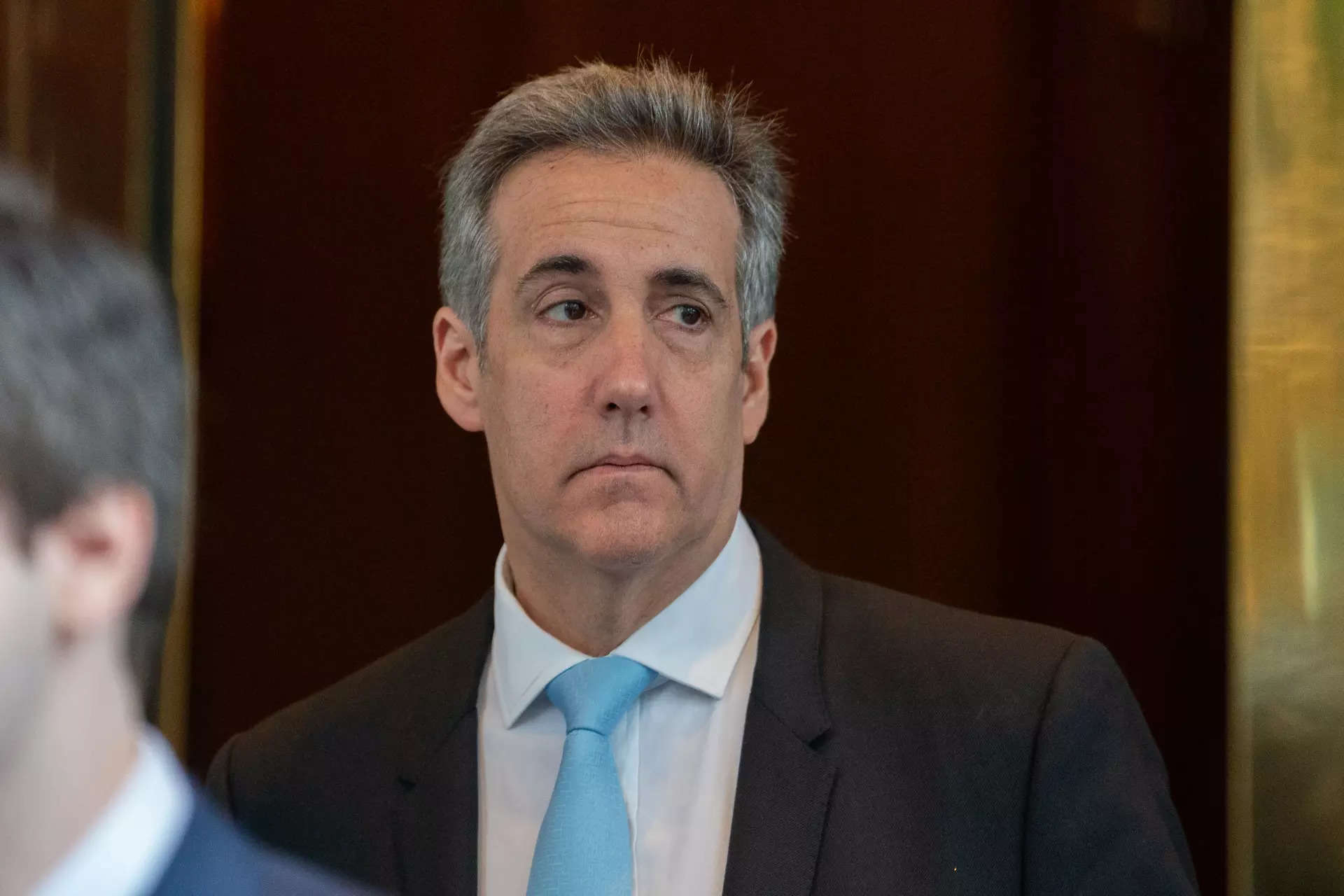[ad_1]
Trump attorney Todd Blanche questioned Cohen at Trump’s hush money trial for about two hours, focusing on how his decade-long devotion to Trump soured after he pleaded guilty to federal crimes in 2018 and went to prison.
Blanche depicted Cohen as a fawning acolyte who turned into a vengeful media hound and made $3.4 million on two books, along with profits from a podcast and merchandise sales — all devoted to condemning Trump as a criminal who should go to jail.
Blanche asked Cohen if he was “obsessed” with Trump, serving as his fixer and lawyer for a decade until after the 2016 election.
“I wouldn’t use the word obsessed, I admired him tremendously,” Cohen told a Manhattan state jury. But Cohen added: “At the time, I was knee-deep into the cult of Donald Trump.”
Blanche sought to undermine the credibility of Cohen, who paid $130,000 in October 2016 to adult film star Stormy Daniels after she claimed she had a sexual encounter with Trump a decade earlier. Cohen said Trump directed him to make the payment to influence the election.
False Premise
Cohen testified Tuesday that Trump’s reimbursements to him in 2017 were all based on the false premise that he provided legal services, not a reimbursement. Trump is accused of falsifying business records to conceal the nature of the payments.
Blanche reviewed some of Cohen’s social media posts and podcast statements that belittled Trump, sometimes in crude terms. He called his former boss “a Cheetos-dusted cartoon villain” and a “dictator d____ bag.”
Earlier, as prosecutor Susan Hoffinger ended her questioning of Cohen, she asked him about what Trump told him after FBI agents raided his home, office and hotel suite in April 2018.
Cohen said Trump told him: “Don’t worry, I’m the president of the United States. There’s nothing here. Everything is going to be OK. Stay tough. Everything is going to be OK.”
In August 2018, Cohen pleaded guilty to tax evasion, lying to a bank and campaign finance violations. He told the jury that was the “worst day of my life.”
Cohen later pleaded guilty to lying to Congress about a Trump hotel project in Moscow. He returned to Congress in February 2019, and apologized for his earlier false testimony.
‘Lying to Them’
He said he apologized to the American people for “lying to them, for acting in a way that suppressed information that the citizenry had a right to know in order to make the determination of the individual who was seeking the highest office in the land.”
Cohen was also shown a series of checks, invoices and other Trump Organization documents that are central to the trial.
He testified that he sent bogus invoices for legal services to get repaid, as part of an agreement with Trump’s company.
“Was this invoice a false record?” Hoffinger asked.
“Yes, ma’am,” he said.
“Did each of those monthly invoices you submitted make the same false representation?”
“Yes, ma’am.”
National Enquirer
The testimony buttressed earlier witness accounts and documents outlining an alleged hush money scheme that began with an August 2015 meeting at Trump Tower involving Trump, Cohen and former National Enquirer publisher David Pecker.
Pecker agreed to publish positive stories about Trump, attack his rivals, and alert Cohen to any salacious stories about Trump and women that could hurt his campaign, Cohen and Pecker both testified.
Cohen gave extensive testimony about his efforts to stay in Trump’s good graces as the hush money plan was playing out. The former lawyer said he knew all along that paying Daniels off was part of a plan to influence the election.
“Why, in fact, did you pay that money to Stormy Daniels?” Hoffinger asked.
“To ensure that story did not come out, did not affect Mr. Trump’s chances of becoming president of the United States,” Cohen said.
“On whose direction did you commit that crime?” Hoffinger asked.
“On behalf of Mr Trump,” he said.
Cohen, who prosecutors say is their last witness, will return to the stand Thursday when the trial resumes.
function loadGtagEvents(isGoogleCampaignActive) { if (!isGoogleCampaignActive) { return; } var id = document.getElementById('toi-plus-google-campaign'); if (id) { return; } (function(f, b, e, v, n, t, s) { t = b.createElement(e); t.async = !0; t.defer = !0; t.src = v; t.id = 'toi-plus-google-campaign'; s = b.getElementsByTagName(e)[0]; s.parentNode.insertBefore(t, s); })(f, b, e, 'https://www.googletagmanager.com/gtag/js?id=AW-877820074', n, t, s); };
function loadSurvicateJs(allowedSurvicateSections = []){ const section = window.location.pathname.split('/')[1] const isHomePageAllowed = window.location.pathname === '/' && allowedSurvicateSections.includes('homepage')
if(allowedSurvicateSections.includes(section) || isHomePageAllowed){ (function(w) { var s = document.createElement('script'); s.src="https://survey.survicate.com/workspaces/0be6ae9845d14a7c8ff08a7a00bd9b21/web_surveys.js"; s.async = true; var e = document.getElementsByTagName('script')[0]; e.parentNode.insertBefore(s, e); })(window); }
}
window.TimesApps = window.TimesApps || {};
var TimesApps = window.TimesApps;
TimesApps.toiPlusEvents = function(config) {
var isConfigAvailable = "toiplus_site_settings" in f && "isFBCampaignActive" in f.toiplus_site_settings && "isGoogleCampaignActive" in f.toiplus_site_settings;
var isPrimeUser = window.isPrime;
if (isConfigAvailable && !isPrimeUser) {
loadGtagEvents(f.toiplus_site_settings.isGoogleCampaignActive);
loadFBEvents(f.toiplus_site_settings.isFBCampaignActive);
loadSurvicateJs(f.toiplus_site_settings.allowedSurvicateSections);
} else {
var JarvisUrl="https://vsp1jarvispvt.indiatimes.com/v1/feeds/toi_plus/site_settings/643526e21443833f0c454615?db_env=published";
window.getFromClient(JarvisUrl, function(config){
if (config) {
loadGtagEvents(config?.isGoogleCampaignActive);
loadFBEvents(config?.isFBCampaignActive);
loadSurvicateJs(config?.allowedSurvicateSections);
}
})
}
};
})(
window,
document,
'script',
);
[ad_2]
Source link






